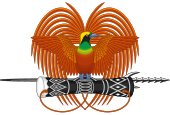
The prehistory of Papua New Guinea can be traced to about 50,000–60,000 years ago, when people first migrated towards the Australian continent. The written history began when European navigators first sighted New Guinea in the early part of the 17th century.

The politics of Papua New Guinea takes place in a framework of a parliamentary representative democratic multi-party system, whereby the prime minister is the head of government. Papua New Guinea is an independent Commonwealth realm, with the monarch serving as head of state and a governor-general, nominated by the National Parliament, serving as their representative. Executive power is exercised by the government. Legislative power is vested in both the government and parliament.

Sir Julius Chan was a Papua New Guinean politician who served as Prime Minister of Papua New Guinea from 1980 to 1982 and from 1994 to 1997. He was Member of Parliament for New Ireland Province, having won the seat in the 2007 national election. He was also the Governor of New Ireland Province from 2007 until his death in 2025. On 26 May 2019, Prime Minister Peter O'Neill announced he would soon resign and that he wished for Sir Julius to succeed him. An outgoing Prime Minister does not, however, have the power to appoint his successor, and the following day O'Neill delayed his own formal resignation. He was also a leading figure in his country during the years-long Bougainville conflict.
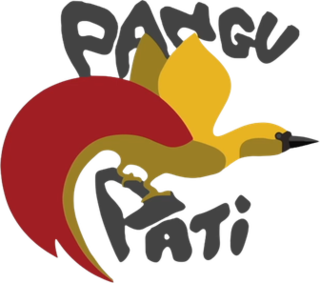
The Pangu Pati, officially Papua na Niugini Yunion Pati, is a nationalist and developmentalist political party in Papua New Guinea. The party is the oldest political party in Papua New Guinea and has held all levels of government throughout its history. As of 2023, it is the largest party in the National Parliament.
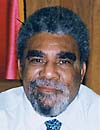
Sir Mekere Morauta was a Papua New Guinean politician and economist who served as the 7th Prime Minister of Papua New Guinea from 1999 to 2002. Inheriting a depressed economy and a fractious legislature, he embarked on fundamental reforms of the country's economy and political system.
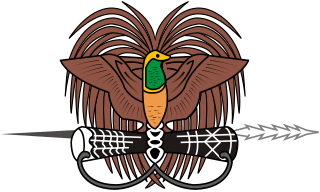
The National Executive Council (NEC), also known as the Cabinet of Papua New Guinea functions as the policy and decision-making body of the executive branch within the government system of Papua New Guinea. The Prime Minister and Ministers serve as members of the Cabinet.
Francis Marus is a Papua New Guinean politician. He has been a member of the National Parliament of Papua New Guinea since July 2007, representing the electorate of Talasea Open. He was Minister for Higher Education, Research, Science and Technology in the government of Peter O'Neill from July 2016. He was previously the Deputy Speaker of the National Parliament from 2007 to 2012. He has variously represented the Pangu Party (2007–2012), the Papua New Guinea Party (2012–2013), the United Resources Party (2013–2014) and the People's National Congress (2014–present).

James Marape is a Papua New Guinean politician who has served as the prime minister of Papua New Guinea since May 2019. He has been a member of the National Parliament of Papua New Guinea since July 2007, representing the electorate of Tari-Pori Open in Hela Province in the New Guinea Highlands. He has held Cabinet Posts as Minister of Education (2008–2011), Minister of Finance (2012–2019), and Minister of Foreign Affairs (2023–2024). Marape entered the 2022 elections under the banner of the Pangu Party and won the most seats, while still being far from a majority. He was therefore able to form government, which was elected unopposed by the new parliament.

Sir Puka Temu,, is a Papua New Guinean politician. He has been a member of the National Parliament of Papua New Guinea since 2002, representing the electorate of Abau Open. A former Deputy Prime Minister under Michael Somare, he is part of Prime Minister James Marape's government as a member of the Our Development Party.
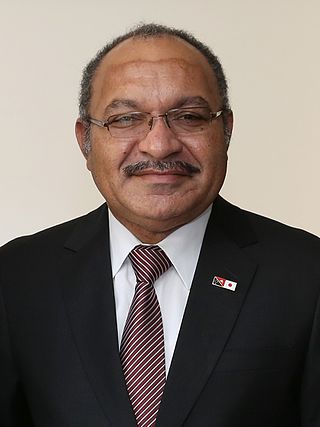
Peter Charles Paire O'Neill is a Papua New Guinean politician who served as the seventh Prime Minister of Papua New Guinea from 2011 to 2019. He has been a Member of Parliament for Ialibu-Pangia since 2002. He was a former cabinet minister and the leader of the People's National Congress between 2006 and 2022. He resigned his position as prime minister to avoid a vote of no confidence, and he was succeeded by James Marape.
Belden Namah is a Papua New Guinean politician. Namah is a member of the National Parliament for the Papua New Guinea Party, and has represented Vanimo-Green River District since 2007. He served in the Cabinet from 2007 to 2010, and as Deputy Prime Minister from 2011 to 2012. In 2012, Namah became a member of the opposition. After retaining his seat in the 2022 election, he said that he would not rejoin the opposition.
Aide Ganasi was a Papua New Guinean politician. He was a People's National Congress member of the National Parliament of Papua New Guinea from July 2012 to March 2013 and from September 2013 until November 2016, representing the electorate of South Fly Open.

Samuel H. Basil was a Papua New Guinean politician. He was a member of the National Parliament of Papua New Guinea from 2007, representing the electorate of Bulolo Open, until his death in 2022. From 8 June 2019, to August 2019 Basil served as the Treasurer of Papua New Guinea.
Patrick Pruaitch, CMG is a Papua New Guinea politician who represented the Aitape-Lumi constituency in the West Sepik Province of Papua New Guinea in the National Parliament of Papua New Guinea from 2002 to 2022. He was a Cabinet Minister with few interruptions from 2002–2010 and from 2012–2017. From November 2019–November 2020, he was Minister for Foreign Affairs. From 2017–2019 and 2020-2022 he was Leader of the Opposition. He was twice – in 2019 and 2020 – alternate PM in unsuccessful attempts to unseat the government.

Bryan Jared Kramer is a Papua New Guinea politician and Member of the 10th and 11th Parliament of Papua New Guinea. Formerly a member of the Pangu Party, he founded the Allegiance Party, of which he was the sole MP, in 2018. He ran nine candidates in the 2022 National Elections, including one in each of Madang's seven electorates. Kramer was returned with a sizeable majority, but was unsuccessful in securing the election of another Party member. He was suspended from office on 30 September 2022 pending the outcomes of a leadership tribunal. On Tuesday 28 February 2023 the three-man bench unanimously found Kramer guilty of seven counts against him. A three-man bench recommended dismissal for two counts of "scandalising the judiciary" and fines totalling K10,000 (USD3,000) for five counts related to use of district funds. Kramer was dismissed from office by the Governor General on 24 May 2023. He will not be able to re-contest an election for five years, allowing him to compete in the 2032 election. A by-election for Madang Open will be held in 2024.
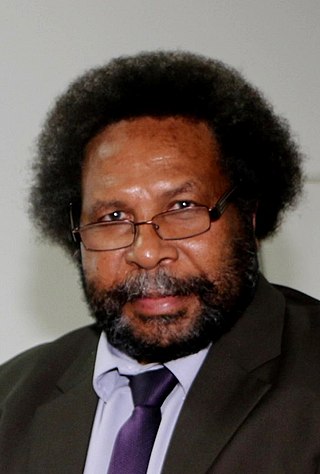
Soroi Marepo Eoe CMG is a Papua New Guinea politician. He has been a Member of the Papua New Guinea National Parliament since 2017, representing the electorate of Kikori Open. On 7 June 2019, he was appointed Minister for Foreign Affairs and Trade and held the position for five months before being replaced, and later returning to the same position on 20 December 2020 serving until 23 August 2022. He was later appointed as Minister for Provincial and Local Level Government Affairs on 24 August 2022 following the formation of the Marape-Rosso Cabinet after the 2022 National General Elections. He is the Southern Region Leader of the Pangu Pati since 11 August 2022.
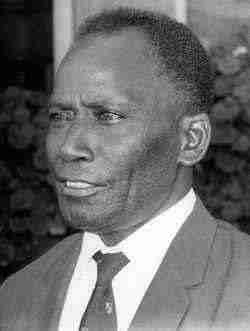
Sir Paul Lapun was a Papua New Guinean politician. Both a supporter of independence for Papua New Guinea (PNG) and of the secessionist movement on Bougainville, Lapun served in the House of Assembly of Papua and New Guinea and in the first National Parliament of Papua New Guinea between 1972 and 1975, when he was Minister for Mines and Energy. He was instrumental in obtaining royalties for the people of Bougainville for the copper mine on their island. He was the first Papua New Guinean to receive a knighthood.
Job Pomat CMG is a Papua New Guinean politician. He has represented the electorate of Manus Open in the National Parliament of Papua New Guinea on two separate occasions since 2007 and has been Speaker of the National Parliament since 2017.
Events in the year 2022 in Papua New Guinea.

General elections will be held in Papua New Guinea at some point in or before 2027 to elect members of the National Parliament.
